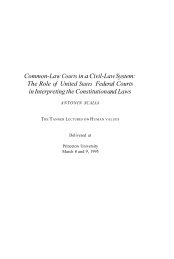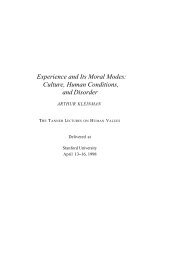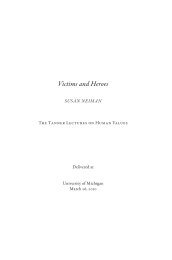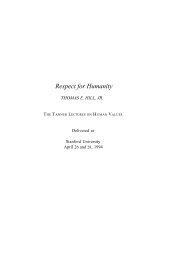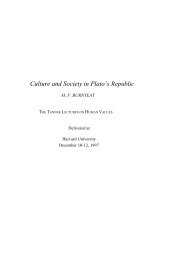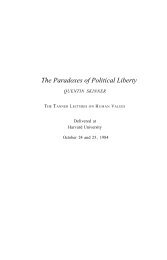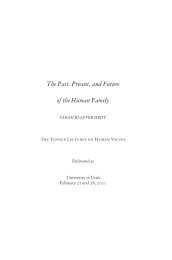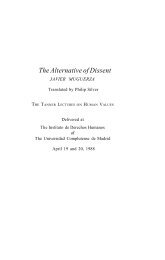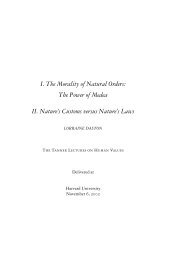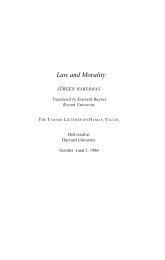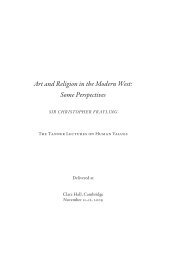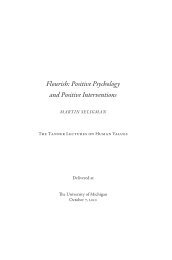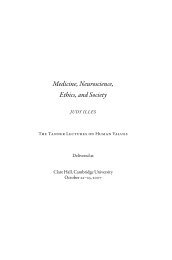Slote, Michael - The Tanner Lectures on Human Values
Slote, Michael - The Tanner Lectures on Human Values
Slote, Michael - The Tanner Lectures on Human Values
Create successful ePaper yourself
Turn your PDF publications into a flip-book with our unique Google optimized e-Paper software.
82 <str<strong>on</strong>g>The</str<strong>on</strong>g> Tunner <str<strong>on</strong>g>Lectures</str<strong>on</strong>g> <strong>on</strong> <strong>Human</strong> <strong>Values</strong><br />
there is no issue of your keeping both copies - every available<br />
copy is needed for the use of the guests. We have a clear example<br />
of misplaced attentiveness and recognizing this, but not wanting<br />
to hurt the feelings of the overeager employee, you simply<br />
say: “No, thank you, I’m doing just fine with the copy I have.” 4<br />
What will be the motivati<strong>on</strong> for rejecting the offered paper?<br />
Surely not the energy it takes to switch papers - it also takes<br />
energy to turn the offer down and a quick comparis<strong>on</strong> of energies<br />
expended is highly unlikely to lie behind the rejecti<strong>on</strong>. But neither,<br />
as in so many of our other examples, can the motivati<strong>on</strong> derive<br />
from the fact that the newspaper offered in exchange is seen as<br />
much more than <strong>on</strong>e really needs or cares about. We are supposing<br />
<strong>on</strong>e does really want to have a paper. In the circumstances<br />
menti<strong>on</strong>ed there can <strong>on</strong>ly be <strong>on</strong>e reas<strong>on</strong> for turning down the<br />
exchange, the fact that <strong>on</strong>e is fine, or doing fine, ds <strong>on</strong>e is, and<br />
I believe that the motivating force of the status quo is clearly evidenced<br />
in the just-menti<strong>on</strong>ed example. But if the satisfactoriness<br />
of the status quo is a motivating factor in cases where the issue of<br />
going bey<strong>on</strong>d what <strong>on</strong>e needs is irrelevant, I see no reas<strong>on</strong> to deny<br />
it a (reinforcing) role in those cases where the issue of need or<br />
lack of need is also present. <str<strong>on</strong>g>The</str<strong>on</strong>g> pers<strong>on</strong> who turns down an afterno<strong>on</strong><br />
snack would seem to have two sorts of motivati<strong>on</strong> for doing<br />
so: the fact that he doesn’t particularly need or care about the<br />
snack in questi<strong>on</strong>; and the entirely satisfactory nature of his present<br />
state, of the status quo; and when some<strong>on</strong>e uses an expressi<strong>on</strong><br />
like “I am perfectly satisfied as I am” to turn down such a snack,<br />
he invokes both of these factors.<br />
We have thus discovered two different sorts of reas<strong>on</strong>s for<br />
moderate choice within the array of examples I have been using<br />
to defend the n<strong>on</strong>-irrati<strong>on</strong>ality of satisficing moderati<strong>on</strong>. <str<strong>on</strong>g>The</str<strong>on</strong>g>re<br />
4 Of course, if <strong>on</strong>e wanted to humor the employee, <strong>on</strong>e might accept the exchange.<br />
But it seems perfectly reas<strong>on</strong>able to reject the exchange and in that case the<br />
reas<strong>on</strong> will be as I have said. Also, I am not denying that we sometimes go against<br />
the status quo in the name of variety. But where variety is not an issue, as with the<br />
present example, the status quo can play a role in motivating our choices.



